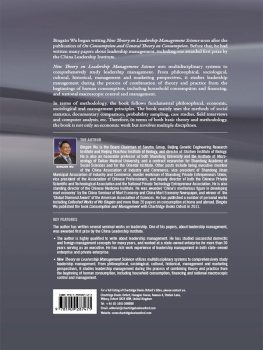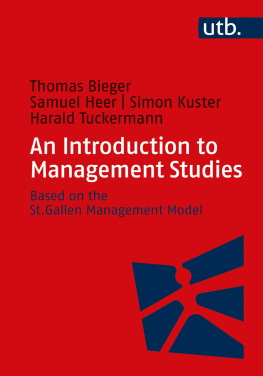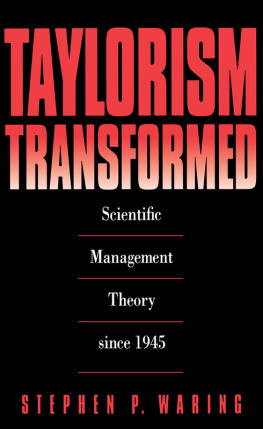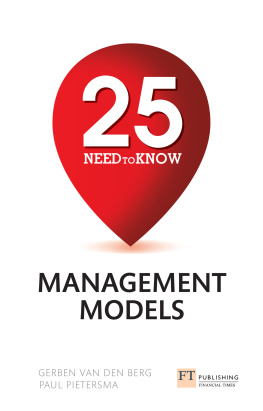New Theory on Leadership Management Science
New Theory on Leadership Management Science
B INGXIN W U

Chartridge Books Oxford
Hexagon House
Avenue 4
Station Lane
Witney
Oxford OX28 4BN, UK
Tel: +44 (0) 1865 598888
Email:
Website: www.chartridgebooksoxford.com
First published in 2013 by Chartridge Books Oxford
ISBN print: 978-1-909287-47-1
ISBN digital (pdf): 978-1-909287-48-8
ISBN digital book (epub): 978-1-909287-49-5
ISBN digital book (mobi): 978-1-909287-50-1
B. Wu, 2013
The right of Bingxin Wu to be identified as author of this work has been asserted in accordance with sections 77 and 78 of the Copyright, Designs and Patents Act 1988.
British Library Cataloguing-in-Publication Data: a catalogue record for this book is available from the British Library.
All rights reserved. No part of this publication may be reproduced, stored in or introduced into a retrieval system, or transmitted, in any form, or by any means (electronic, mechanical, photocopying, recording or otherwise) without the prior written permission of the publishers. This publication may not be lent, resold, hired out or otherwise disposed of by way of trade in any form of binding or cover other than that in which it is published without the prior consent of the publishers. Any person who does any unauthorised act in relation to this publication may be liable to criminal prosecution and civil claims for damages. Permissions may be sought directly from the publishers, at the above address.
Chartridge Books Oxford is an imprint of Biohealthcare Publishing (Oxford) Ltd.
The use in this publication of trade names, trademarks service marks, and similar terms, even if they are not identified as such, is not to be taken as an expression of opinion as to whether or not they are subject to proprietary rights. The publishers are not associated with any product or vendor mentioned in this publication. The authors, editors, contributors and publishers have attempted to trace the copyright holders of all material reproduced in this publication and apologise to any copyright holders if permission to publish in this form has not been obtained. If any copyright material has not been acknowledged, please write and let us know so we may rectify in any future reprint. Any screenshots in this publication are the copyright of the website owner(s), unless indicated otherwise.
Limit of Liability/Disclaimer of Warranty
The publishers, author(s), editor(s) and contributor(s) make no representations or warranties with respect to the accuracy or completeness of the contents of this publication and specifically disclaim all warranties, including without limitation warranties of fitness for a particular purpose. No warranty may be created or extended by sales or promotional materials. The advice and strategies contained herein may not be suitable for every situation. This publication is sold with the understanding that the publishers are not rendering legal, accounting or other professional services. If professional assistance is required, the services of a competent professional person should be sought. No responsibility is assumed by the publishers, author(s), editor(s) or contributor(s) for any loss of profit or any other commercial damages, injury and/or damage to persons or property as a matter of products liability, negligence or otherwise, or from any use or operation of any methods, products, instructions or ideas contained in the material herein. The fact that an organisation or website is referred to in this publication as a citation and/or potential source of further information does not mean that the publishers nor the author(s), editor(s) and contributor(s) endorses the information the organisation or website may provide or recommendations it may make. Further, readers should be aware that internet websites listed in this work may have changed or disappeared between when this publication was written and when it is read.
Typeset by Domex e-Data Pvt. Ltd., India.
Printed in the UK and USA.

Contents

List of figures and tables
Figures
Tables

Foreword I
Yuanchen Dai
Three years ago, Mr. Wus On Consumption was published by Contemporary China Publishing House in three volumes with 1.5 million characters. General Theory of Consumption was published later. The publication of the two works generated a great response in society. Seminars on them were held in Beijing and Jinan respectively. Mr. Wu was invited not only to some domestic universities to give lectures, but also to the University of Houston, and the Victoria and Texas A&M University of Commerce. The publication of the English version of his book later caused much excitement. I thought he would take a rest for a short time after the publication of these two books, but he surprised me by announcing that his new book New Theory on Leadership Management Science of over 1 million characters is about to be published again.
Mr. Wus study of leadership management started before rather than after the publication of On Consumption. He even began preparations for the book during the early 1990s and used part of the research in the book On Consumption.
Mr. Wu is well-qualified for research on leadership management as he worked in a State-owned company for over thirty years, and then in private companies for nearly thirty years after Chinas reforms and opening-up, thus gaining a wealth of experience and practice within a planned economy as well as in a private one. Based on wide-ranging leadership and management experience, his writing is extensive in content and he puts forward many distinctive ideas in comparative research. After retirement from the State-owned company 25 years ago, Mr. Wu tried his best to run his own enterprise with the spirit of ongoing self-improvement. He started in Baotou, moved to Huainan, and finally settled in Jinan. He established the Sanzhu Group Company, which is involved with healthcare products, medicine, medical treatment equipment, hospitals, ecological cosmetics and other related industries with fixed assets of one billion Yuan. It has a maximum annual sales income of 8.4 billion Yuan and a maximum tax payment of 820 million Yuan. It was once the biggest private company in China and praised as an economic miracle by economists both at home and abroad. In 1994 it was praised as a new high-tech enterprise by the State Science and Technology Commission and the Shandong Science and Technology Commission. In 1997 it was again praised as a key new high-tech enterprise in the State Torch Program by the State Science and Technology Commission. In 1997 it was awarded a five-star diamond prize by the American Excellent Service Science Association. In December of the same year, Sanzhu was named as one of the most famous Shandong trademarks.
This book is a masterpiece, undertaking systematic and full research on leadership management with knowledge taken from several fields. While tracing the source of human consumption and a combination of theory and practice, it has carried out research on leadership management at different levels of the State enterprises, family consumption and finance planning, as well as State macro-control management from the point of view of philosophy, sociology, culture and history. It is more practical for him to take leadership and management as a whole in research. The 1980s are a dividing line for the relationship between leadership and management. Before, people treated them as two aspects of the same issue. For example, Peter Drucker, the father of modern management, regarded leadership and management as a whole in his book
Next page











